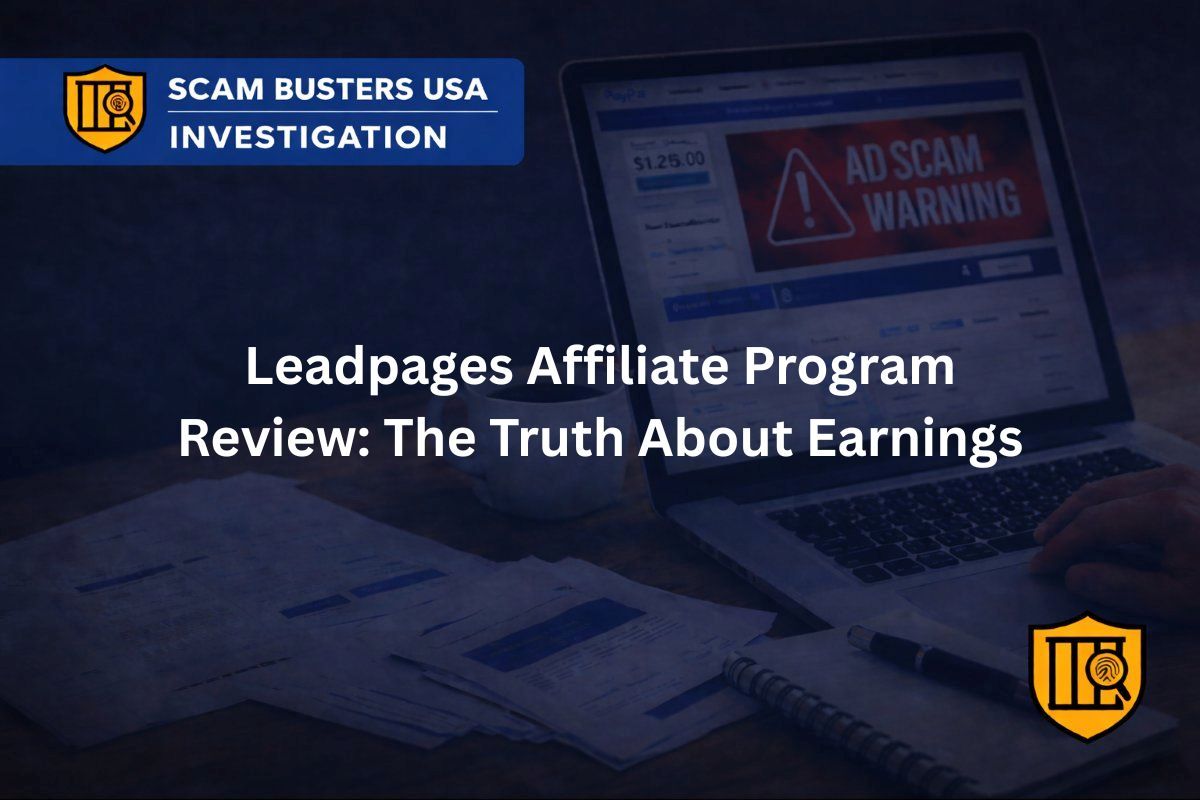Is Leadpages really a smart affiliate program to promote — especially if you’re still building your traffic and audience? Let’s talk about it honestly.
If you’re still learning how affiliate marketing works or you don’t have steady traffic yet, the best place to start is here — where you learn how to build the skills that make any affiliate program profitable:
Start Here (Beginner-Friendly Training):
Check out My #1 Recommendation (The Training I’ve Used For Over A Decade)
(No pressure — just a resource when you’re ready.)
What Leadpages Actually Is (Simple & Clear)
Before we get into the affiliate program itself, it’s important to understand what Leadpages actually does and why people use it. Because you can’t effectively promote something unless you understand the purpose it serves — and more importantly — the point in someone’s business journey where it makes sense.
Leadpages is a software platform designed to help entrepreneurs and businesses:
Build high-converting landing pages
Create lead capture forms that collect email subscribers
Design pop-ups and alert bars to engage visitors
Run simple sales funnels without needing a full funnel builder
Turn website visitors into leads and leads into customers
In other words, Leadpages helps convert the traffic you already have into meaningful business growth. It’s not just about having pages that look good — it’s about pages that get people to take action. That’s where Leadpages stands out. The templates, the layouts, and the built-in optimization tools are all geared toward increasing conversions, not just creating something visually appealing.
If you’re familiar with tools like ClickFunnels, Unbounce, or even the landing page builder inside ConvertKit, Leadpages belongs in that same family — but with a slightly different emphasis. ClickFunnels, for example, leans heavily into complex funnels and upsells. Leadpages, on the other hand, keeps things simple, fast, and effective, which is why a lot of solo entrepreneurs and small businesses love it.
Who Leadpages Is Actually Designed For
Leadpages shines when the user already has:
A blog, website, or content channel that brings traffic
A product, service, or offer (even something small, like a free download or coaching session)
A basic understanding of who their audience is and what they want
So, the people who get the most value from Leadpages are often:
Coaches and consultants who want to generate leads
Content creators who want to grow an email list
Course creators and membership site owners
Small business owners who want a simple funnel setup
Bloggers and affiliate marketers who want better conversions
These are people who already have someone to talk to.
Who Leadpages Is Not Designed For (Yet)
This is where beginners get tripped up.
Leadpages is not an ideal first tool for someone who:
Has no niche or target audience yet
Is not publishing content anywhere
Does not have a website or traffic source
Is still learning the basics of affiliate marketing
Doesn’t yet understand why someone would subscribe or buy
If you don’t have traffic, even the best landing page in the world won’t generate leads.
A landing page without traffic is like a billboard placed in the middle of the desert — it may look great, but nobody is ever going to see it.
The Key Point to Understand
This is a theme you’ll see throughout this review:
Leadpages is a great tool — after you learn how to get traffic.
Once you have traffic, it becomes one of the most valuable tools in your toolbox.
Because once visitors start coming to your blog, videos, emails, or social posts, you want to be able to capture them, follow up, and build trust over time.
And that’s where Leadpages works beautifully.
But without traffic first, all the landing page templates in the world won’t make a difference.
So now that we understand what Leadpages does — and who it’s suited for — we can take a closer look at how the affiliate program works, what it pays, and whether it truly makes sense as a revenue stream depending on where you are in your business journey.

How the Leadpages Affiliate Program Actually Works
Now that we understand what Leadpages does and who it’s really for, let’s take a closer look at the affiliate program itself — because this is the part that tends to get advertised the most.
On the surface, the Leadpages affiliate program is simple:
You sign up → You get a unique referral link → You earn a commission when someone signs up for Leadpages through your link.
Pretty straightforward. But there are some important details that make this program different from many others in the affiliate marketing space.
Let’s break it down clearly, without hype.
How Commissions Work
Leadpages pays recurring commissions — meaning you don’t just earn money once when someone signs up. You continue to earn a percentage every month as long as the customer keeps their subscription active.
This is where the excitement around Leadpages comes from.
When you refer a customer, you earn 30% of their subscription cost
And you earn that every single month, not just once
For example:
If someone signs up for a $49/month plan, you earn $14.70 per month.
If they stay for a year, that’s $176.40 earned from one referral.
Multiply that by several referrals, and this becomes a very real income stream.
Recurring affiliate programs = long-term income.
And Leadpages has one of the better recurring structures in the industry.
Affiliate Tracking & Platform
Leadpages manages its affiliate program through PartnerStack, a well-known and reputable affiliate network.
This means:
Your referrals are tracked accurately
You can see clicks, account sign-ups, and conversions in real time
You don’t have to worry about whether your commissions are being counted
PartnerStack is clean, transparent, and beginner-friendly from a tracking standpoint.
Cookie Duration
Leadpages uses a 30-day cookie window.
This means:
If someone clicks your link, you’ll get credit if they sign up anytime within 30 days.
This is pretty standard in SaaS affiliate programs.
Not amazingly long — but not short either.
Payout Schedule
Leadpages pays affiliates monthly — and the payouts are reliable.
The only condition is that you must meet the minimum payout threshold.
For new affiliates, this can sometimes feel slow in the beginning. But it becomes smoother once you start generating consistent sign-ups.
So Far, So Good… But Here’s the Real Question
The program itself is solid.
No red flags.
No shady upsells.
No misleading compensation tricks.
This is a legitimate and well-structured affiliate program.
But — and this is where reality comes in —
The commission structure only becomes meaningful if you can generate steady traffic from the right audience.
Leadpages is not an impulse-buy product.
People sign up for it when they:
Already have something to sell or offer
Already have content or traffic
Already need better lead conversion tools
Which brings us to the part most affiliate reviews gloss over:
The earning potential depends almost entirely on your ability to drive targeted traffic.
And that’s what we’re going to break down clearly in the next section.
The Pros (What Leadpages Does Well & Why Affiliates Promote It)
Leadpages has a genuinely solid affiliate program, and there are some real advantages here — especially once you have even a small audience that trusts your recommendations.
Let’s look at the biggest strengths quickly and clearly:
1. The Product Is Legit and Helpful
Leadpages isn’t a hype product or a “make money quick” tool. It does something practical and important: it helps businesses turn website visitors into leads and customers. And that matters, because promoting something useful is always easier than trying to convince someone they need a tool that doesn’t solve a real problem.
2. Recurring Commissions = Long-Term Income
This is where Leadpages stands out.
They pay 30% recurring commissions, meaning you earn not just once, but every month your referral continues their subscription. A single referral today can still be paying you next year. That’s the kind of income that stacks, grows, and compounds over time — which is what most affiliate marketers are ultimately trying to build.
3. Strong Brand Recognition Helps Conversions
Leadpages is a respected name. People see it recommended often. That familiarity makes it easier to trust — and that trust translates into higher conversion rates. You don’t have to explain what it is for ten minutes before getting to the point. When someone is at the stage of needing landing pages, Leadpages is already on their radar.
4. Affiliate Tools Make Promotion Easier
Leadpages gives you useful promotional resources (tracking dashboard, banners, swipe copy, etc.), which helps you start faster and test what works without reinventing the wheel.
So yes — there are real strengths here.
The program itself is not the problem.
But strengths alone don’t automatically equal success — and this is where most affiliates get stuck.
Because even with a good product and a solid commission structure…
If you don’t have traffic, you won’t earn.
And that brings us directly into the reality-check portion of this review.

The Cons (Where Most Affiliates Get Stuck)
Now that we’ve covered the strengths of the Leadpages affiliate program, we need to be honest about the other side of the equation — the part that most promotional reviews gloss over.
The Leadpages affiliate program is not beginner-friendly.
Not because the program itself is complicated — it’s actually one of the simpler and more transparent affiliate setups out there — but because of what it takes to succeed with it.
Leadpages is designed for people who already have:
An audience
A traffic source
A business model
And something to offer
If you don’t have those pieces in place yet, Leadpages becomes very difficult to earn with. And that’s where most affiliates run into frustration — not because they’re doing something wrong, but because they’re trying to promote a “Stage 3 tool” at Stage 1 of their journey.
Let’s break down the biggest barriers.
1. You Need Traffic Before You Can Earn
This is the core issue.
Leadpages helps convert visitors into leads and customers — but it does not create visitors.
If you don’t have traffic, even the best landing page builder in the world won’t generate sign-ups.
This is where many new affiliates misunderstand the process. They believe that promoting a high-quality tool alone will produce income — but affiliate marketing doesn’t work that way.
Successful affiliate marketers understand:
Traffic → Value → Trust → Conversion
(Leadpages enters only after trust is established.)
If you’re still working on the skills that build that process, I highly recommend reviewing this foundational guide:
Essential Skills For Online Entrepreneurs (internal link)
Not to overwhelm you — just to show that Leadpages is part of a bigger system, not the system itself.
2. The Audience for Leadpages Is Narrow
Leadpages is not a casual consumer tool.
The person who signs up for it is almost always someone who:
Is already creating content
Already wants to grow an email list
Already sees the value of landing pages
This means not everyone in your audience will be a match.
So conversions depend not just on traffic — but on the right kind of traffic.
If your audience is made mostly of beginners, this creates a mismatch:
They need to learn traffic strategies before they need conversion tools.
3. Beginners Often Mistake Tools for a Business Strategy
This is extremely common.
Many people start affiliate marketing thinking:
“If I just promote the right tool, everything else will fall into place.”
But tools are not the strategy.
Tools support the strategy.
If you’re still exploring whether affiliate marketing truly works long-term, this breakdown may help clarify expectations and timelines:
Does Affiliate Marketing Really Work?
The answer is yes — but only when the right steps come in the right order.
And that’s the real challenge here:
Most people try to promote Leadpages before they learn how to build traffic.
So no — the Leadpages affiliate program is not a scam.
And it’s not “too saturated.”
And it’s not priced unfairly.
The issue is simply timing.
Leadpages works beautifully after you have the skills that make affiliate marketing profitable in the first place.
And that leads us directly into the most important section of this review:
What you actually need to succeed with the Leadpages affiliate program — and every affiliate program.
The Earnings Reality Check (What You Can Actually Expect)
Now that we’ve covered the strengths and challenges of promoting Leadpages, let’s talk about what everyone really wants to know:
“How much can I actually earn with the Leadpages affiliate program?”
This is where a lot of online reviews start making big promises.
But affiliate marketing doesn’t work through luck, hype, or “easy buttons.”
It works through traffic, relevance, and trust.
Your earnings are determined by two main factors:
Whether your audience actually needs Leadpages
Whether you have consistent traffic flowing to your content
Leadpages isn’t something people buy on impulse.
They buy it when they’re already serious about building an audience, growing an email list, or converting traffic more effectively.
So instead of hyping “unlimited earnings,” let’s look at what most affiliates actually experience based on where they are in their journey:
What Earnings Actually Look Like (Realistic Scenarios)

| Affiliate Stage | Typical Traffic Source | Likely Monthly Earnings | Why |
| Beginner | Social media, no authority | $0–$25/month | Not enough targeted traffic yet |
| Early Intermediate | Blog with occasional organic search | $50–$300/month | Some interest, low conversion rate |
| Intermediate | Blog + email list + SEO strategy | $300–$1,500/month | Traffic is targeted and warm |
| Advanced Marketer | Established brand + funnels | $2,500–$10,000+/month | High-intent leads with trust built in |
What stands out here is simple but powerful:
Higher earnings come from stronger trust and better audience alignment — not from promoting harder.
Why Most Beginners Earn Very Little at First
It’s not because they’re doing anything “wrong.”
It’s because they’re still developing the skills that create consistent conversions:
-
Choosing a niche that makes sense
-
Publishing helpful content regularly
-
Learning how to get traffic (SEO, YouTube, Pinterest, etc.)
-
Building trust before making recommendations
If you’re currently in this stage, this will help you understand the process step-by-step:
→ The How To Guide Of Affiliate Marketing
This isn’t about discouragement.
It’s about making sure you’re building your business in the right order — instead of wasting time on tools that don’t help yet.
The Pattern Every Successful Affiliate Eventually Learns
Affiliate marketers who earn well promoting Leadpages almost never start by promoting Leadpages.
They start by learning how to:
-
Drive traffic
-
Build trust with an audience
-
Communicate value clearly
Once those skills are in place?
Leadpages becomes easy to promote — because your audience is already warmed, engaged, and ready.
And that brings us to the most important insight in this entire review:
Traffic is the real missing skill — not tools.
The Real Missing Skill: Traffic (The Part 95% of Reviews Ignore)
At this point, the pattern should be clear:
Leadpages is a conversion tool.
Which means it only works after you have people to convert.
This is the part almost every “Top Paying Affiliate Programs!” article skips — either because they don’t understand it or because it doesn’t sound exciting enough to get clicks.
But if you’re serious about earning consistent affiliate income, you need to understand this clearly:
Traffic is the engine. Everything else is accessories.
You can have:
-
The best landing page tool
-
The best affiliate link placement
-
The best commission structure
But if no one is seeing your content, nothing happens.
This is why so many beginners feel like they’re “doing everything right” but still not seeing results. It’s not a lack of effort — it’s a lack of the strategic skills that generate qualified attention.
Not any attention.
Relevant attention.
People who are already interested in the transformation you’re helping them move toward.
Traffic Is Not One Thing — It’s a System
When I say “you need traffic,” I don’t mean shouting on social media and hoping someone clicks a link.
Traffic means:
-
A niche that has demand
-
Content that solves real problems
-
Search intent that aligns with your offers
-
Consistency long enough to earn trust
In other words:
Traffic is a byproduct of being genuinely useful.
That’s why the affiliates who succeed long-term aren’t just promoting tools — they’re teaching, guiding, helping, demonstrating, and leading.
And that’s also why the transition from “I want to make money online” → to actually earning money online happens when a person shifts from promotion → to value.
If you’re currently in the phase of developing those skills, this is something worth reading through:
→ Essential Skills For Online Entrepreneurs (internal link)
Not to overwhelm you — but to shorten the learning curve.
Because once you understand traffic, everything else becomes 10X easier.
Why Traffic + Trust = Conversions
Someone might click your affiliate link by accident.
But someone buys because they:
-
Trust you
-
See value in what you recommend
-
Understand the benefit of the tool
-
Believe you aren’t just pitching them to get paid
Trust is built through:
-
Honest reviews
-
Transparent experiences
-
Helpful tutorials
-
Showing the why, not just the what
And here’s the key:
Leadpages fits in after trust is already being built.
That’s why the affiliates who do best promoting Leadpages are:
-
Bloggers with educational content
-
YouTubers showing tutorials and walk-throughs
-
Niche experts who understand their audience deeply
-
Creators who publish consistently (even small audiences can convert well)
They don’t sell.
They teach.
And people buy from teachers.
Now We Reach the Pivot Point
Before you promote Leadpages successfully, you need the foundation that makes any affiliate program profitable:
-
A website or platform where your content lives
-
A small but growing stream of visitors
-
A message and niche that make sense together
-
And content that solves problems for real people
Once you have those pieces, Leadpages becomes a natural recommendation — not a forced one.
And here’s where we offer clear direction, not hype:
If you’re at the stage where you’re building your traffic, your message, your content, and your skillset — start here first.
This is where you learn the foundational strategy that makes all affiliate income possible:
→ Check Out My #1 Recommendation and Learn Affiliate Marketing The Right Way!
No pressure.
No urgency.
Just the next logical step.
Leadpages vs Wealthy Affiliate (Clear, Skill-Based Comparison)
Up to this point, we’ve talked about:
-
What Leadpages does well
-
Why its affiliate program has real potential
-
And the actual skills required to earn consistently
Now it’s time to show how Leadpages fits into a bigger picture — and where Wealthy Affiliate comes in.
Because the truth is:
Leadpages is not an entry point. It’s a scaling tool.
Wealthy Affiliate is where you learn how to build traffic, trust, and profitable content systems — the exact foundations required to sell anything online.
Leadpages is what you add after those foundations exist to help you scale.
These two platforms are not competitors.
They solve different stages of the journey.
To make that clear, here’s a practical comparison you can understand at a glance:
| Feature / Requirement | Leadpages Affiliate | Wealthy Affiliate |
| Best For | Marketers with existing traffic | Beginners & growth-focused creators |
| Teaches How to Get Traffic | ❌ No | ✅ Yes — step-by-step |
| Purpose | Convert existing traffic into leads/sales | Help you create content and build traffic |
| Community + Support | Limited | Active 24/7 training & mentorship |
| Earning Model | 30% Recurring commissions | Recurring commissions + multiple income streams |
| Learning Curve | Medium–High | Beginner-friendly
|
The Key Takeaway
Leadpages is powerful — but only when traffic already exists.
Wealthy Affiliate is where you learn to build that traffic, trust, and foundation.
So the real path looks like this:
-
Start with learning traffic + content strategy
(Wealthy Affiliate) -
Build your website and audience
(Your niche grows) -
Then introduce Leadpages as a value-boosting tool
(Conversions increase → earnings compound)
This is why the affiliates who promote Leadpages successfully aren’t “lucky.”
They simply stacked the skills in the right order.
And Here’s the Good News
You don’t need:
-
A huge audience
-
Paid ads
-
Fancy funnels
-
Or hundreds of posts
You just need:
-
A niche that makes sense
-
Helpful content produced consistently
-
A simple strategy executed over time
That’s it.
And that’s exactly what we cover next:
The Smart Path: How to Promote Leadpages Successfully (Even as a Beginner)
By now, we’ve made something very clear:
Leadpages works extremely well — but only after you have traffic and trust in place.
So instead of trying to promote Leadpages too early and getting discouraged, here’s the strategy that actually works, even if you’re starting from scratch.
This is the same progression used by successful affiliates — and it’s what keeps your business growing instead of stalling.
Step 1: Start With a Clear, Narrow Niche
Don’t try to sell to “everyone who wants to make money online.”
That market is too broad, too noisy, and too competitive.
Instead, choose a very specific group with a shared need:
-
Fitness coaches trying to get new clients
-
Real estate agents needing more buyer leads
-
Etsy sellers wanting email subscribers
-
Wedding photographers booking local clients
-
Dog trainers selling digital lessons
Specific niche = Clear messaging = Easier conversions.
Leadpages naturally fits into niches where people want to grow an audience or client list.
Step 2: Create Helpful, Searchable Content
Traffic doesn’t happen by accident.
You create it by publishing helpful content consistently, such as:
-
Tutorials
-
Step-by-step guides
-
Practical problem solutions
-
Real examples + screen shares
Examples of content that lead naturally to promoting Leadpages:
-
“How to Create a Lead Magnet That Gets Sign-Ups”
-
“The 5 Easiest Ways to Grow an Email List in 2025”
-
“How to Turn Instagram Followers into Clients”
-
“Simple Funnel Setup for Beginners (No Tech Overwhelm)”
Notice how all of these topics teach first.
You don’t pitch.
You help — and trust builds.
Step 3: Build Trust Before Recommending Tools
Most affiliates try to sell immediately.
That’s why most affiliates struggle.
People don’t buy because of a link.
They buy because they trust the person who recommended it.
Trust is built through:
-
Honest explanations
-
Personal experience
-
Showing what works (and what doesn’t)
-
Making recommendations for the reader’s benefit
→ Read My Honest Wealthy Affiliate Review
Step 4: Introduce Leadpages at the Right Time
Once your audience understands:
-
Why building an email list matters
-
How online trust is built
-
Why converting traffic is important
Leadpages becomes the solution — not the pitch.
The recommendation feels:
-
Natural
-
Helpful
-
Welcome
-
And earned
That’s what converts — and that’s how recurring commissions actually stack.
If you’re in the stage of building traffic, learning SEO, and developing your online identity — start here:
Start With the Training That Teaches the Skills First →
Get Your Free Wealthy Affiliate Account Here!
No urgency.
No pressure.
Just the next right step in the sequence.
FAQs & Common Misconceptions About the Leadpages Affiliate Program
When people look into the Leadpages affiliate program, they usually have the same questions — and for good reason. There’s a lot of surface-level information out there, but very little that explains how success actually happens with this program.
So let’s address the questions that matter most.
FAQ #1 — Is the Leadpages Affiliate Program Legit?
Yes — the Leadpages affiliate program is 100% legitimate.
There’s no hidden “pay to play,” no forced upgrades, no MLM-style tiers, and no shady loopholes.
You promote a real software product that helps real businesses grow.
The key is understanding that it works best after you have traffic, trust, and a defined audience — not before.
FAQ #2 — Can Beginners Make Money Promoting Leadpages?
Beginners can make money — but most won’t right away.
And that’s not because Leadpages is bad.
It’s because:
Beginners typically don’t have consistent traffic yet.
This is why so many new affiliates get frustrated. They’re promoting the right tool at the wrong time.
If you’re just starting to build your online presence, this guide will help you understand the first steps clearly:
→ The How To Guide of Affiliate Marketing
Mastering the foundation first makes everything else easier.
FAQ #3 — How Much Can You Earn From Leadpages?
Most successful affiliates earn recurring monthly income — meaning the effort you put in continues to pay you over time.
The realistic range depends on where you are in your business:
-
Beginners: $0–$50/month (learning phase)
-
Growing affiliates: $300–$1,500/month
-
Established brands: $2,500–$10,000+/month
The affiliates at the high end didn’t get there by accident — they built traffic consistently.
FAQ #4 — Do I Need a Website to Promote Leadpages?
Technically: No.
Realistically: Yes, if you want long-term earnings.
Could you post your affiliate link on social media and hope someone clicks? Sure. But there’s no strategy, no sustainability, and no trust there.
A website or blog gives you:
-
Authority
-
Search visibility
-
Evergreen traffic
-
A reason people trust you
This is why so many successful affiliates start by learning how to build a website and content system.
FAQ #5 — When Does Leadpages Make Sense to Promote?
Leadpages makes the most sense when:
-
You have traffic
-
You are helping people grow something (audience, leads, business)
-
Your audience is already at the “expansion stage”
Promoting it before your audience has something to promote creates friction.
Promoting it after trust exists feels natural and converts easily.
FAQ #6 — Should I Start With Leadpages or Start With Learning Affiliate Strategy?
Start with the strategy.
Leadpages helps you scale — but scaling before you’ve built the foundation is like adding a second floor to a house with no first floor.
If you’re building your foundation now, this is the place to begin:
→ Read My Honest Wealthy Affiliate Review
This guides you through the skill-building stage that makes tools like Leadpages profitable.
Final Thoughts: The Path That Actually Works
If there’s one message I hope you take away from this review, it’s this:
Leadpages works.
The affiliate program is solid.
The recurring commissions are real.
And the product genuinely helps businesses grow.
But Leadpages is not the starting line.
It’s the tool you introduce once you have traffic and trust in place.
When you build your foundation first — when you learn how to create helpful content, attract the right people, and guide them toward solutions — promoting tools like Leadpages becomes natural… almost effortless.
That’s how affiliate income becomes:
-
Predictable
-
Ethical
-
Sustainable
-
Long-term
-
And yes… passive
Not lucky.
Not hype-based.
Not dependent on chasing trends.
Just real work → real skill → real results.
If you’re at the stage where you’re still building that foundation, this is your next step — and it’s an important one:
You need a place that teaches you:
-
How to choose your niche
-
How to create helpful content that gets noticed
-
How to build an audience that trusts you
-
How to make affiliate recommendations the right way
That’s exactly what Wealthy Affiliate is designed for.
Not a shortcut.
A path.

Deeper Reading (Highly Recommended Next Steps)
If you found this review helpful, these guides will help you continue your progress:
Choose one and keep learning — even 15 minutes of clarity per day compounds fast.
About the Author

Hey, I’m Jason — the creator behind Scam Busters USA.
I started in affiliate marketing over a decade ago, and like a lot of people, I spent the early years getting pulled into “shortcut systems” that promised easy money. I learned the hard way that there are no shortcuts — just proven skills, applied consistently, with honesty and patience.
Today, I teach from experience — not theory.
My goal is simple:
To help you avoid the mistakes I made, skip the scams, and build something real online — something you’re proud of, something that lasts, and something that gives you freedom, not stress.
If you ever have questions, you can comment below — I do read them.
And I’m here to help.
Affiliate Disclosure
Some of the links in this article are affiliate links, which means I may earn a small commission at no extra cost to you. I only recommend tools and training I personally trust and use.



This is one of the most balanced and honest reviews of the Leadpages affiliate program I’ve come across. Thank you for not just repeating the sales page and for highlighting the real-world challenges, like the 30-day cookie window.
For someone just starting out in the affiliate marketing space, would you still recommend Leadpages as a good first program, or are there other page-builder affiliates you’d suggest before this one?
Appreciate that — I try to keep every review focused on what actually works, not just what the sales page says. Leadpages is a strong tool once you already have traffic and understand funnels, but for someone just starting out, it’s not the easiest first affiliate program to earn with. The 30-day cookie window and steeper learning curve can make it a slow start for beginners.
If you’re new to the affiliate space, I’d suggest beginning with Wealthy Affiliate. It’s where I learned the fundamentals of building traffic, writing content that converts, and promoting programs the right way — without hype or guesswork. Once you’ve got that foundation, adding page builders like Leadpages makes a lot more sense (and profit).
— Jason, Scam Busters USA
Thanks for sharing the Leadpages affiliate program review.
The Leadpages affiliate program is legitimate and offers 30% recurring commissions, but success depends on having traffic and a trusting audience. Beginners often struggle because Leadpages converts visitors; it doesn’t create them. To earn consistently, you need foundational skills like building a website, publishing helpful content, and growing an audience. Essentially, Leadpages is a powerful scaling tool, best used after you’ve established traffic and trust, often through training platforms like Wealthy Affiliate that teach these essential strategies.
Keep up the good work!
Hi there,
Thank you for taking the time to share this — and sorry for the slightly delayed reply. The Thanksgiving weekend had me buried in projects and I’m just now catching up on comments.
You summed up the heart of the Leadpages review perfectly. The program itself is absolutely legitimate, and the recurring commissions are generous, but the real challenge is what you pointed out: Leadpages converts traffic — it doesn’t create traffic. That’s where so many beginners get tripped up. They start with the tool instead of the foundation.
Once someone has a niche, consistent content, and an audience that trusts them, tools like Leadpages can become powerful multipliers. But without those core skills, even great software can feel like it’s “not working.”
That’s exactly why I point beginners toward training platforms that actually teach traffic, content, SEO, and audience building first. Once those pieces are in place, programs like Leadpages start making a lot more sense.
Really appreciate the thoughtful feedback — and thanks again for the patience while I caught up.
— Jason